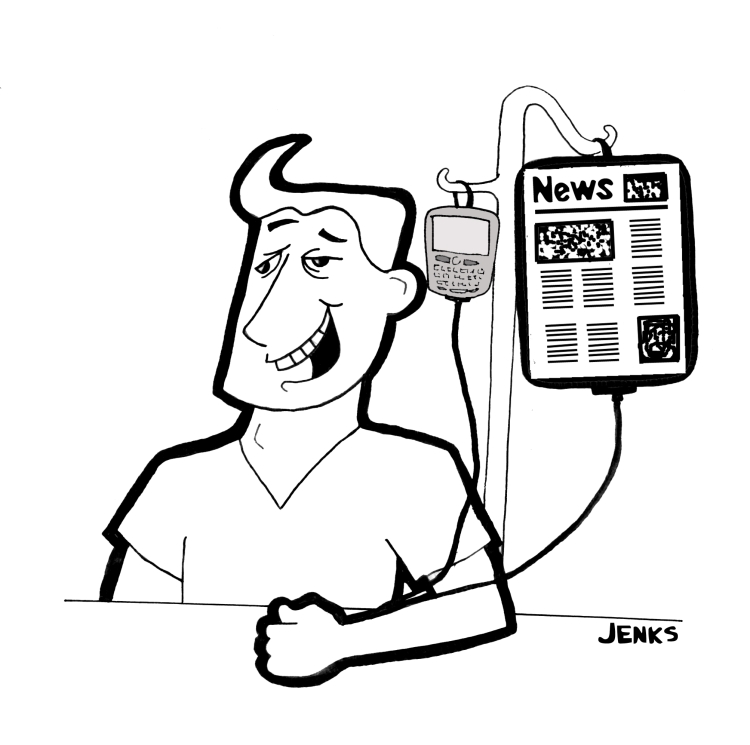“No news is good news.”
Ludovic Halevy
Many of us spend our days bombarded with information – either from newspapers, tv, radio, mail; or with our heads in the high-tech “clouds.” We text and email like it’s a matter of life and death. Yet despite this unprecedented connectedness, we can sometimes feel more disconnected than ever before.
How addicted are you to information? Is it your lifeline? Ask yourself the following questions:
- In meetings, do you feel the urge to pull out your smartphone to check messages?
- Do you read the newspapers or watch the news every day? Have you ever been “listening” to someone, whilst emailing or texting?
- Do you have to post something online to ‘make it real’?
- Do you get withdrawal symptoms if you are offline for any time?
- Can you live without your phone for a day?
You might be an information addict, and even if you’re not – you’ll know somebody who IS addicted. Many people have become information junkies – the more we get, the more we seek. But here’s the news: it’s not helping us.
In ‘Blink’, Malcolm Gladwell states that having too much information interferes with the accuracy of your judgement. It’s usually irrelevant and confuses things. Focus on the most critical information to make a decision. More information generally just confirms and reinforces your own judgement – it doesn’t make it more accurate. Better judgements come from simple, sparse information. If the big picture is clear enough, there’s no need to use a magnifying glass.
Today, a Masai Warrior in the desert on a mobile phone has better mobile communications than the richest man did 25 years ago. Through Google, he would have more information to hand than the government had only 15 years ago. During the last 20 years, there has been a technological acceleration never seen before. We will soon be able to meet and exceed the basic needs of every man, woman, and child on the planet. Abundance for all is within reach. There is no doubt that technology is a force for good. But beware of its dark side: information overload.
Too much information can potentially leave us anxious, overwhelmed, and unproductive. We are surrounded by an enormous QUANTITY of information. But not necessarily QUALITY. It is difficult to tell what is important and what is not. Any truly useful information becomes buried in an excess of useless information that crashes into our awareness and steals our energy and mental focus. It all becomes “white noise” which is simply a distraction.
Worse still, much of the news and information we receive has a negative bias. Every violent death, act of terrorism, major crime, economic recession and political upheaval, however remote, hits us: live, instantly, and repeatedly. Good news seems to be limited.
There is a reason for a negative bias to news stories – bad news sells. But this feeds into problems with the way we think – focusing on the negative. It’s primeval: during our brain’s evolution, missing a piece of bad news could mean death, so our brains are hardwired to pay attention to danger, disaster and bad news. Now that there’s no need to watch out for sabre-toothed tigers, this negative bias holds us back. It can make us risk-averse and subconsciously more cautious in our decision-making. We are on the alert for things going wrong.
And yet the world we live in is better than it has ever been. Poverty has declined more in the past 50 years than in the previous 500. During the last 100 years, child mortality has decreased by 99 percent, while the average human lifespan has more than doubled. Murder rates are a hundred times less than they were 500 years ago. As well as being healthier and living longer, we’re safer. So, the news is good.
The world is an incredible place full of opportunities, yet the media’s negative bias consistently tells us it’s not. Why not create a positive, good news bias to help us think bigger and make more positive decisions, moving the human race forward to achieve great things?
Try giving yourself a break from information. If news matters enough – you’ll hear about it. Think bigger, and make positive decisions on the big picture. See if your life improves and you become more positive as a result.
Go on a ‘One Week Low Information Diet’. This means: .
- No web surfing No social networking
- No excessive email checking
- No news. You will hear about it quick enough if it is bad!
- No non-entertainment television!
Free yourself from the need for information and news – and see how much time you liberate and how you can change your focus.
- What else can you do to eliminate information overload in your business and your life?
- Use all that freed-up time constructively – to change your world for the better. Solve problems, instead of watching them unfold in the media.
- Develop your own positive information bias. Concentrate on more life-affirming things. Create your own amazingly good news, instead.
Further Reading:
Blink by Malcolm Gladwell (Amazon UK, US)
The Four Hour Work Week by Tim Ferris (Amazon UK, US)
The Happiness Advantage by Shawn Anchor (Amazon UK, US)
The Power of Habit by Charles Duhigg (Amazon UK, US)
If the above topic, or indeed any of my blogs are of interest to you, then contact me and let’s talk! Drop me an email at getintouch@marcwinn.com.
Buy Me a Coffee
Did you love this article? If so please consider buying me a coffee.
Take The 50 Coffee Adventure
A Fun, Light and Easy Way to Build Connections
Or search your local Amazon store for "The 50 Coffee Adventure".

It’s hard to find well-informed people on this subject,
however, you seem like you know what you’re talking about!
Thanks